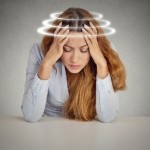Vertigo

Spinning is fun—when you’re a child. Not so much when you’re an adult, and especially not when you haven’t done anything to create the spinning sensation you’re experiencing!
Vertigo, by definition, is the sensation of spinning in the absence of moving. Medical causes for vertigo point to underlying pathology in the inner ear, the brain, or in your sensory (feeling) nerve pathways. Additionally, I have treated patients who dizziness stemmed from a whiplash injury which sent their neck muscles into a spasmed tizzy. Once the injured muscles are restored to their pre-injury length, texture, and tone, my patients’ dizziness is eliminated.
Many physical therapists have been educated in the evaluation and treatment of benign paroxysmal positional vertigo (BPPV), which is one of the most common causes of vertigo. Dizziness from BPPV is typically “set off”, or should I say, “set in motion”, by certain reproducible movements of the head or by changes in body position, such as rolling over or sitting up in bed. Though quite disturbing, the dizzy sensation of BPPV rarely lasts longer than a minute. Yet this is enough time to create nausea or induce vomiting in some.
Here is a helpful link to a video which demonstrates an effective, self-treatment technique to try before (or after) seeking medical help. It was developed by Otolaryngologist, Carol Foster, M.D., who happened to wake one morning a victim of her own field of study—vertigo! Simply copy and paste this link into your search bar and it will take you directly to her You Tube video. https://www.youtube.com/watch?v=1VWyPgfMuvM
On rare occasion, dizziness can be a sign of something more serious. So please seek immediate medical attention if your spinning sensation is accompanied by any of these other signs or symptoms:
- A headache of great severity
- Numbness or tingling
- A temperature above 100.5°F
- Double vision/ loss of vision
- Hearing loss
- Difficulty speaking
- Weakness in your arm or leg
- Difficulty walking
- Falling due to loss of balance
- Loss of consciousness